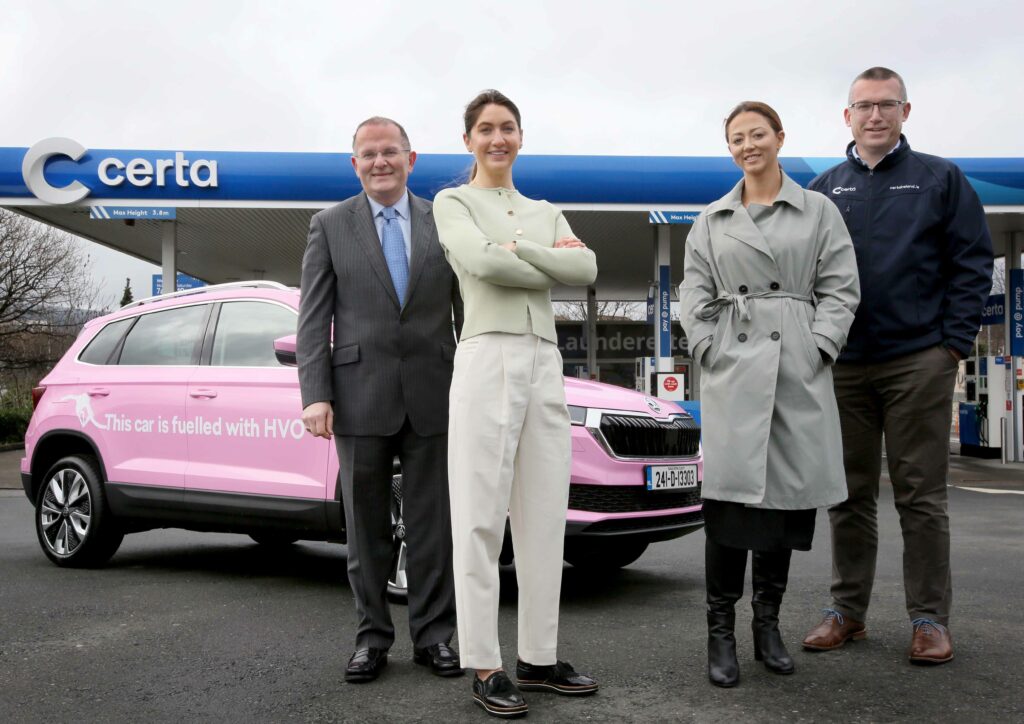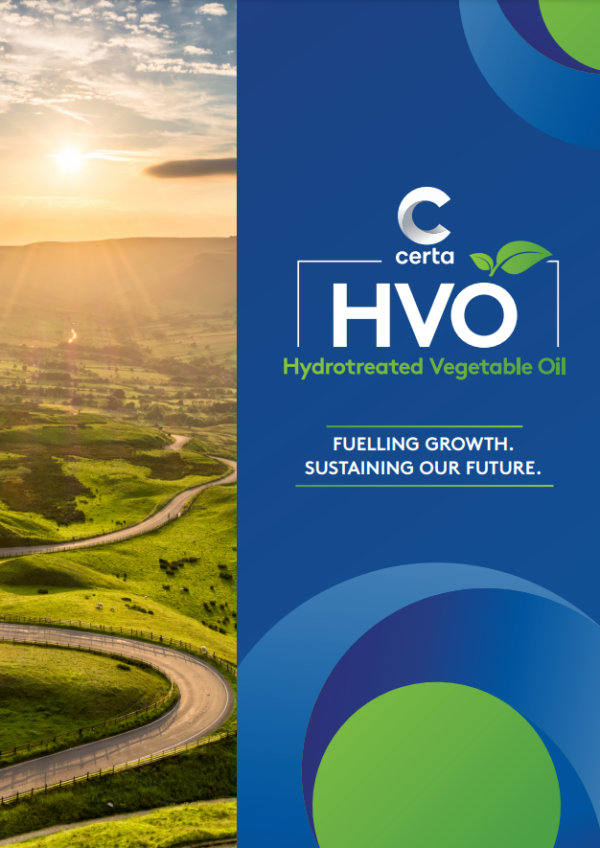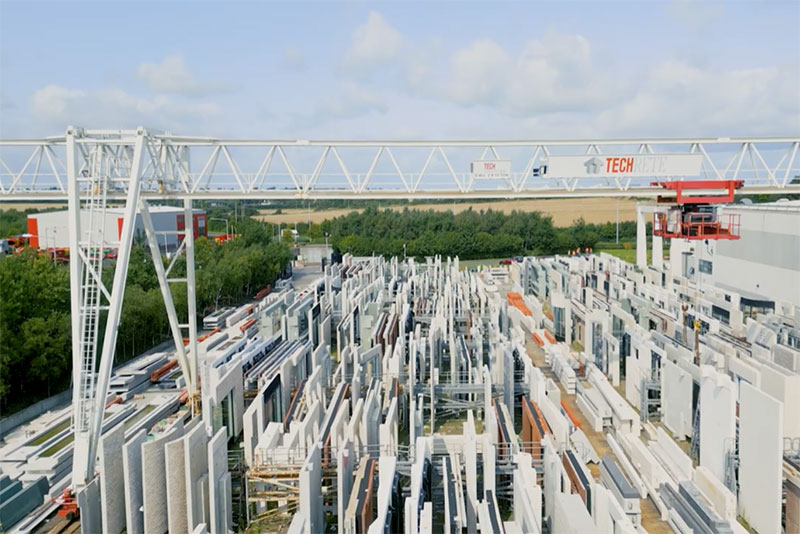Renewables
We're Teaming Up with Skoda to Supply HVO to New Car Buyers!

Škoda Ireland and Certa have today launched a new joint campaign aimed at encouraging owners and would-be buyers of new diesel cars to use HVO biofuel to lower their motoring carbon emissions by up to 90%.
The leading car brand and one of Ireland’s largest fuel suppliers are partnering on the initiative aimed at creating awareness of the benefits of using hydrotreated vegetable oil (HVO) as a replacement for diesel.
As part of the awareness and promotional campaign, Škoda is providing buyers of diesel Škoda models with a Certa HVO biofuel voucher of either €250 or €500 depending on the model of car purchased. The promotion will apply to cars purchased in the month of March.
HVO biofuel is a relatively new fuel and is usually sold at a slightly higher cost than diesel. Certa currently has an offer which matches the price of HVO with that of diesel. The company, which is part of DCC plc, has also announced plans today to introduce new HVO pumps at more forecourts throughout the country.
Certa is in the process of upgrading its network of 41 unmanned, pay@pump forecourts to offer HVO at all fuel pumps alongside other fuels.
HVO is currently available at Certa forecourts in Liffey Valley in Dublin, Lee Tunnel in Cork and Trim in Meath. Certa is planning to have seven more forecourts HVO-ready by the end of this year. The forecourts planned to be fitted with HVO pumps are located in Dundrum, Tallaght and Finglas in Dublin, Maynooth in Kildare, Letterkenny in Donegal and Athlone and Mullingar in Westmeath.
As part of the campaign, Škoda will also run radio, social and outdoor ads effective immediately. The ads and the awareness campaign will seek to alert diesel motorists to the availability and benefits of HVO as an alternative fuel to diesel.
HVO is a second generation low-carbon biofuel that serves as a direct replacement for regular diesel without any need for vehicle or engine modifications. It is produced using waste plant-matter and hydrogen, which means it does not release any additional carbon emissions into the atmosphere and can result in a 90% net reduction in CO2 emissions. HVO is distinguished at fuel pumps through the use of a pink nozzle, which stands out from the black diesel and green petrol ones.
In Ireland, HVO is expected to meet a large proportion of the increase in biofuel supply to decarbonise the transport sector and is considered a vital transition fuel as electric powered vehicles continue to become more mainstream.
HVO can be used as a direct replacement for diesel in a wide variety of fleet, plant and machinery equipment in addition to passenger cars. It can also be mixed with diesel in any ratio. The performance of diesel engines using HVO is near identical to when they are fuelled with diesel.
As a leading car manufacturer, Škoda is acutely aware that sales of diesel and petrol-powered cars are scheduled to end in 2035 and that pure electric cars are now clearly the best and most sustainable option for new car buyers. The brand already sells hybrid and plug-in hybrid vehicles as well as two electric-only models, with plans to offer six electric-only models by 2026.
Škoda, however, also recognises the status and potentially important role of HVO as a transition fuel and a cleaner alternative to diesel and, as such, is seeking to encourage both existing owners of diesel cars and any buyers of new diesel cars to consider HVO as an alternative.
HVO is recognised by the Irish government as a 100% replacement for conventional diesel with greenhouse gas reduction benefits.
Diesel-powered cars accounted for 22% of the passenger car market in 2023, just ahead of electric on 19%. While sales of electric cars have increased and the market share of diesel cars has fallen over time, diesel-powered cars are still favoured by many motorists while there is a high number of diesel cars already in the national fleet. Škoda is a market leader when it comes to diesel passenger car sales with a 22% share of the diesel car market.
As part of the HVO awareness campaign, Škoda has launched an online vehicle checker where owners of diesel Škoda models can enter their registrations to confirm their car’s HVO-readiness. The tracker and more information on HVO can be found online here.
Škoda has also confirmed that all new Škoda diesel models will be HVO-ready and all diesel models manufactured from mid-2021 are HVO-ready.
While most modern diesels can operate using HVO without any changes, owners are advised to confirm their cars HVO-readiness by contacting their manufacturer.
"We are excited to partner with Certa on this campaign, which aims to encourage existing owners or buyers of new diesel cars to use HVO as an alternative to diesel. At Škoda, we recognise the importance of switching to electric cars, but we also recognise that many buyers are still choosing diesel models for a variety of reasons. They may not have access to a home charger, for example, or they may want a car with an extensive range.
For these motorists, it makes sense to switch to HVO as the fuel becomes more widely available. We believe diesel car owners will consider this switch if they are made aware of the benefits of HVO and we hope our promotional and marketing campaign will increase awareness among not just Škoda owners, but all owners of diesel cars.”John Donegan, Brand Director, Skoda Ireland
“We are delighted to work with Škoda on this campaign. At Certa, our goal is to make it easy for motorists to transition to HVO as a renewable alternative to diesel. HVO’s benefits are well established, so we believe drivers of diesel cars will switch to HVO if they are encouraged to do so and if they understand that it works as a drop-in replacement without the need for modifications.
By switching to HVO, these motorists will reduce their own carbon footprint, but they will also help to lower the emissions of the country’s transport sector. “Most modern diesel cars are HVO-ready, but we would advise all owners to check with the manufacturer of their car to make sure this is the case. Once this is confirmed, all they have to do is fill up their car using our HVO pumps, which we are now installing alongside existing petrol and diesel pumps at a growing number of our forecourts. As part of the campaign, we have announced our plans to widen the availability of HVO by increasing the number of HVO-ready forecourts from three to ten by year end. As it is a new fuel, HVO is usually sold at a slightly higher price than diesel. This is a small price to pay given the benefits, but at Certa we are currently matching the price of HVO to the price of diesel.”Andrew Graham, Managing Director, Certa
About HVO
HVO (Hydrotreated Vegetable Oil) is a low-carbon, high performance biofuel that can deliver up to a 90% reduction in carbon emissions.
It serves as a 100% drop-in replacement for diesel, making it a cleaner way to run diesel cars in addition to a wide variety of machinery and equipment across a range of industries. Cars run using HVO perform in the same way and have the same driving characteristics as they do when powered by conventional diesel. HVO can also be mixed with regular diesel.
Unlike first generation biofuels, which are made from crops such as rapeseed and soy, HVO is a second-generation biofuel which means it is made from100% renewable and pre-existing bio-waste products, primarily used cooking and vegetable oil from food industry waste.
Also, unlike conventional biodiesel, hydrogen is used as a catalyst instead of methanol, making it cleaner than any other fossil fuel alternative currently available.
HVO provides full lifecycle greenhouse gas (GHG) emission savings of up to 90% when compared to conventional diesel. Direct emissions from burning HVO are considered to be zero or carbon neutral.
HVO is recognised by the Irish government as a drop-in replacement for conventional diesel with greenhouse gas reduction benefits. HVO is expected to meet a large proportion of the increase in biofuel supply needed to decarbonise the transport sector in the short-term and as a transition measure.
HVO is odourless and is more suited to being stored than conventional diesel. It also offers superior cold weather performance, down to -30 degrees.
HVO produces less notifiable particulate matter and nitrogen oxide emissions, meaning it is better for air quality than conventional diesel.
As it is a relatively new fuel, HVO generally involves a slightly higher cost when compared to regular diesel. At present, Certa is matching the price HVO to that of diesel at its forecourts.
As HVO offers a reduction in net carbon emissions of almost 90%, it is promoted as potentially creating cost savings for businesses that might otherwise use diesel, which would impact on their efforts to meet their carbon reduction targets.
For businesses that use diesel and for private owners of diesel cars, HVO offers the quickest and most cost-effective way to reduce carbon emissions.
Diesel cars run on HVO generally achieve a 10% reduction in AdBlue consumption which helps to close the price gap between the two fuels.











